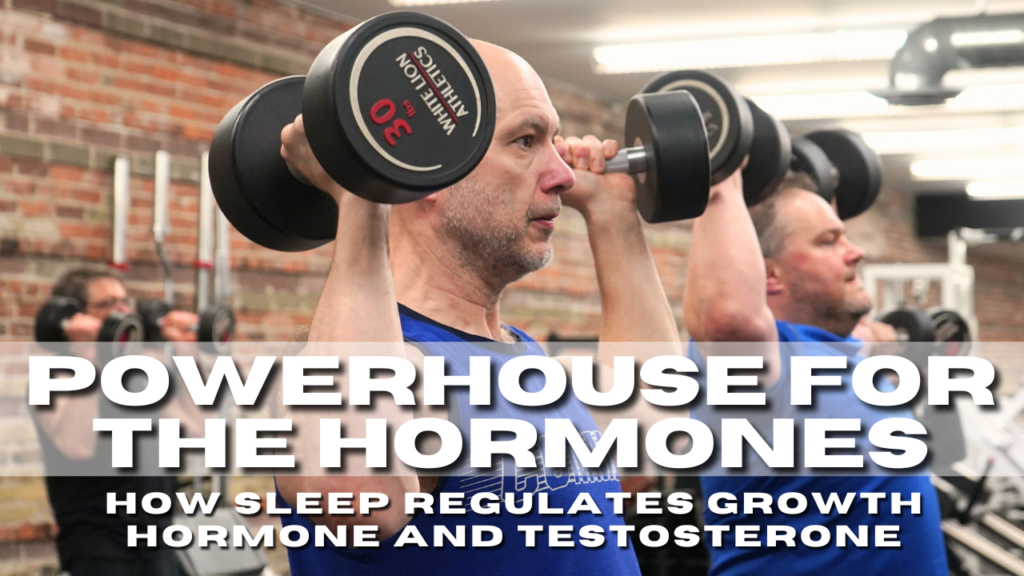
You already know the grind: train hard, eat right, repeat. But if you’re not sleeping enough, you’re leaving gains on the table — especially when it comes to the hormones that drive muscle growth and strength. Think of sleep as your secret anabolic window — without it, your body simply can’t recover or grow properly.
The Role of Hormones in Muscle Growth
Hormones are your body’s internal messengers. When it comes to gaining muscle and building strength, two anabolic (muscle-building) hormones take center stage: growth hormone (GH) and testosterone. These two powerhouses regulate muscle repair, protein synthesis, fat metabolism, and overall training recovery. Without sufficient levels of these hormones, your hard work in the gym won’t yield optimal results.
Sleep as a Hormonal Reset Button
Sleep is not just downtime — it’s a strategic tool. During sleep, your endocrine system (the system responsible for hormone release) becomes highly active, particularly during specific sleep stages.
- Growth Hormone (GH): Roughly 70% of GH is released during slow-wave sleep (deep sleep), especially in the early part of the night (Van Cauter et al., 2000). GH stimulates tissue growth, promotes fat utilization, and helps your muscles recover from training stress.
- Testosterone: Production of testosterone also occurs during sleep, peaking during the first REM cycle and increasing with total sleep duration. Inadequate sleep results in decreased testosterone levels, even in healthy young men (Leproult & Van Cauter, 2011).
Why This Matters for Lifters and General Exercisers
Let’s say you’re hitting the gym four times a week, pushing your limits with heavy deadlifts and presses. If you’re only sleeping five to six hours a night, your testosterone levels may decline, your growth hormone release could be compromised, and your recovery may slow down significantly. Over time, this leads to:
- Plateaus in strength gains
- Decreased muscle mass
- Increased body fat
- Poor motivation and mood
What the Research Says
In a controlled sleep restriction study, healthy young men who slept only 5 hours per night for one week had a 10–15% reduction in testosterone levels — equivalent to what would be expected from aging 10–15 years (Leproult & Van Cauter, 2011).
Another foundational study demonstrated that deep sleep is directly linked to GH secretion. As we age and sleep quality declines, GH secretion also diminishes — which partly explains why recovery becomes harder as we get older (Van Cauter et al., 2000).
Hormonal Imbalance and Muscle Breakdown
When sleep is cut short, cortisol — a catabolic (muscle-wasting) hormone — tends to rise. Cortisol is naturally highest in the morning and decreases throughout the day. But poor or insufficient sleep keeps cortisol elevated longer, which:
- Promotes muscle breakdown
- Increases fat storage, particularly around the midsection
- Impairs insulin sensitivity, affecting muscle fuel uptake
Real Talk from the Gym Floor
You’ve probably seen it: that member who trains consistently but never seems to lean out or get stronger. They might be eating well and training right, but if their sleep is chaotic — late nights, early mornings, disrupted cycles — their hormones are not primed for growth. Recovery isn’t just foam rolling and protein shakes. It’s about getting into deep, uninterrupted sleep every night.
Takeaways
- Sleep is an anabolic tool — treat it as part of your training plan.
- Aim for 7–9 hours per night, especially when you’re lifting heavy or training intensely.
- Prioritize a consistent bedtime, reduce screen time before bed, and create a cool, dark sleep environment.
- Understand that poor sleep won’t just hurt your performance — it can halt your progress.
References
Leproult, R., & Van Cauter, E. (2011). Effect of 1 week of sleep restriction on testosterone levels in young healthy men. JAMA, 305(21), 2173–2174. https://doi.org/10.1001/jama.2011.710
Van Cauter, E., Leproult, R., & Plat, L. (2000). Age-related changes in slow wave sleep and REM sleep and relationship with growth hormone and cortisol levels in healthy men. Journal of the American Medical Association, 284(7), 861–868. https://doi.org/10.1001/jama.284.7.861